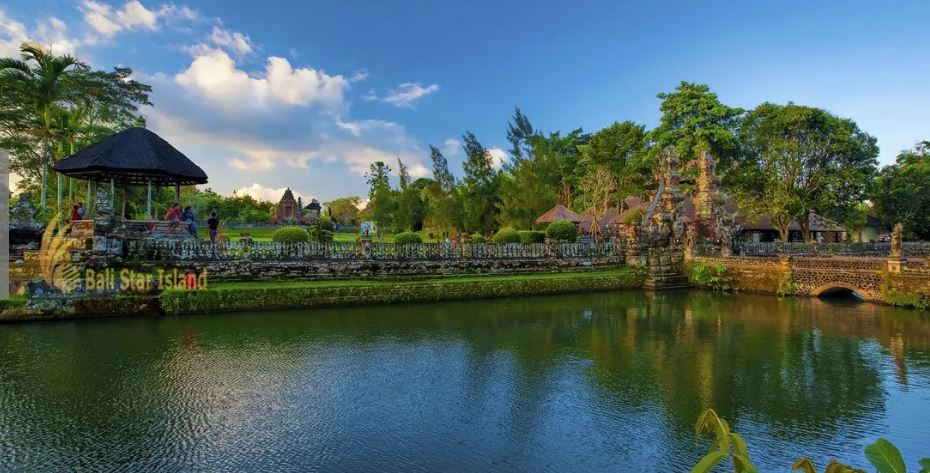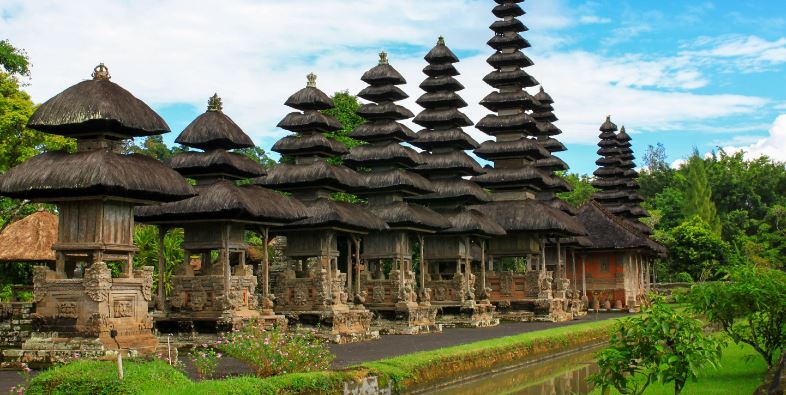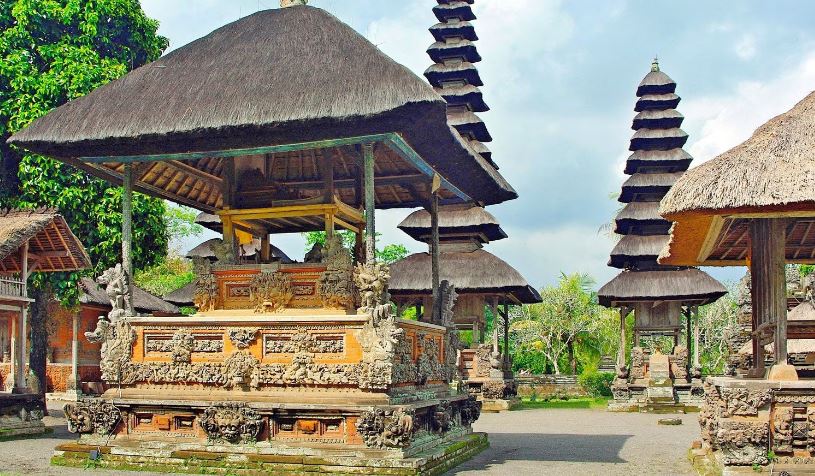About Taman Ayun Temple
Temple History: Taman Ayun Temple was built in the 17th century by the Mengwi dynasty, which ruled the region at that time. It served as the main temple complex for the royal family of Mengwi, making it an important cultural and religious site in Bali’s history. The temple was constructed as a symbol of the dynasty’s power and prosperity, with its impressive architecture and lush gardens showcasing the wealth and artistic achievements of the Mengwi kingdom.

Architecture and Design:
The architecture of Taman Ayun Temple is a fine example of traditional Balinese temple design, characterized by intricately carved stone structures, towering pagodas, and ornate gateways. The temple complex is surrounded by a large moat, adding to its grandeur and beauty. Within the temple grounds, visitors can explore the central courtyard, which houses the main shrines and pavilions dedicated to various Hindu deities.

Cultural Significance:
Taman Ayun Temple holds significant religious and cultural importance for the Hindu community in Bali. It is dedicated to the worship of the Hindu trinity: Brahma, Vishnu, and Shiva, as well as other deities associated with Hindu mythology. The temple serves as a place of prayer, meditation, and spiritual reflection for worshippers and visitors alike
Best Time to Visit and Opening Time
Best Time to Visit:
The best time to visit Taman Ayun Temple is during the early morning or late afternoon when the weather is cooler, and the temple grounds are less crowded. This allows visitors to explore the temple at their own pace and fully appreciate its beauty and tranquility.

Visitor Information:
- Opening Hours: Taman Ayun Temple is open daily from 8:00 AM to 6:00 PM.
- Entrance Fee: The entrance fee to the temple is IDR 20,000 for adults and IDR 10,000 for children.
- Dress Code: Visitors are required to dress modestly out of respect for the temple’s sacredness. This typically means covering the shoulders and knees. Sarongs and sashes are available for rent or provided at the entrance for those who need them.
List of Tours to Visit This Site
Several tour operators in Bali offer excursions to Taman Ayun Temple as part of their cultural and heritage tours. Some popular tours that include a visit to Taman Ayun Temple are:
- Ubud Cultural Tour
- Mengwi Temple Tour
- Bali Heritage Tour
Exploring Taman Ayun Temple can be a fascinating experience, especially when combined with other cultural and scenic attractions in the surrounding area. Here’s a list of popular tours that include a visit to Taman Ayun Temple:
- Ubud Cultural Tour:
- This tour typically includes visits to key cultural landmarks in Ubud, such as the Ubud Palace, Ubud Monkey Forest, and Taman Ayun Temple. Travelers can immerse themselves in Bali’s rich cultural heritage while exploring the artistic and spiritual heart of the island.
- Mengwi Temple Tour:
- This tour focuses on exploring the historical and religious sites in the Mengwi area, including Taman Ayun Temple and other nearby temples. Visitors can learn about the significance of these ancient temples and their role in Bali’s cultural landscape.
- Bali Heritage Tour:
- This comprehensive tour highlights Bali’s diverse heritage, encompassing visits to ancient temples, traditional villages, and historical landmarks. Taman Ayun Temple is often included as one of the key stops on the itinerary, allowing travelers to delve into the island’s rich cultural tapestry.
- West Bali Discovery Tour:
- This tour takes travelers on a journey of discovery through the scenic landscapes and cultural treasures of West Bali. Taman Ayun Temple is often featured as a highlight of the tour, offering visitors a glimpse into the region’s rich history and architectural heritage.
- Private Customized Tours:
- Private tours can be customized to include a visit to Taman Ayun Temple along with other attractions based on the traveler’s preferences and interests. Whether it’s exploring ancient temples, scenic rice terraces, or traditional villages, private tours offer flexibility and personalized experiences.
- Cultural and Spiritual Excursions:
- Specialized tours focused on Bali’s cultural and spiritual heritage often include visits to significant temples like Taman Ayun. These tours may also incorporate activities such as temple ceremonies, cultural performances, and interactions with local communities, providing travelers with immersive experiences.
- Full-Day Sightseeing Tours:
- Full-day sightseeing tours offer a comprehensive overview of Bali’s top attractions, including Taman Ayun Temple. Travelers can enjoy guided visits to iconic landmarks, scenic viewpoints, and cultural sites, all in a single day.
- Customized Photography Tours:
- Photography enthusiasts can join specialized tours designed to capture the beauty of Bali’s landscapes and cultural heritage. Taman Ayun Temple in bali, with its stunning architecture and serene ambiance, provides an ideal backdrop for capturing memorable photographs.
These are just a few examples of the many tours available for exploring Taman Ayun Temple and its surroundings. Whether you’re interested in history, culture, nature, or photography, there’s a tour option to suit every traveler’s preferences and interests.
Map of Taman Ayun Temple
Quick Review: Is Taman Ayun Worth Visiting?
Absolutely! Taman Ayun Temple is definitely worth visiting for several compelling reasons:
- Historical Significance: Taman Ayun Temple is steeped in history, dating back to the 17th century when it was built by the Mengwi dynasty. As one of Bali’s most important cultural and religious sites, it offers visitors a fascinating glimpse into the island’s rich heritage.
- Architectural Beauty: The temple’s stunning architecture is a testament to Balinese craftsmanship and design. From intricately carved stone structures to towering pagodas, every detail of Taman Ayun Temple is a work of art worth admiring.
- Cultural Experience: Visiting Taman Ayun Temple provides a unique opportunity to immerse yourself in Balinese culture and spirituality. Whether you’re exploring the temple’s sacred grounds, observing traditional rituals, or interacting with local worshippers, you’ll gain valuable insights into Bali’s cultural traditions.
- Tranquil Atmosphere: Taman Ayun Temple is set amidst lush gardens and serene surroundings, creating a peaceful ambiance that invites contemplation and reflection. It’s the perfect place to escape the hustle and bustle of everyday life and connect with nature and spirituality.
- Photography Opportunities: With its picturesque landscapes, ornate architecture, and atmospheric lighting, Taman Ayun Temple offers endless opportunities for photography enthusiasts to capture stunning images and create lasting memories.
Overall, Taman Ayun Temple offers a memorable and enriching experience for visitors of all ages and interests. Whether you’re a history buff, a culture lover, or simply seeking a tranquil retreat, a visit to Taman Ayun Temple is sure to be a highlight of your Bali journey.
Where To Park?
Parking facilities are available near Taman Ayun Temple for visitors arriving by car or motorbike. The parking area is well-maintained and conveniently located within walking distance of the temple entrance.
How Much Does it Cost?
The entrance fee to Taman Ayun Temple is IDR 20,000 for adults and IDR 10,000 for children. This fee grants visitors access to explore the temple grounds and enjoy its serene ambiance, stunning architecture, and cultural significance.
It’s worth noting that additional fees may apply for certain activities or services within the temple complex, such as guided tours, cultural performances, or offerings for religious rituals. Visitors should inquire about any optional extras they may be interested in and be prepared to pay additional charges accordingly.
Overall, the entrance fee to Taman Ayun Temple is quite reasonable considering the cultural and historical value of the site, making it an accessible and worthwhile destination for travelers exploring Bali’s rich heritage.
What To Wear?
As Taman Ayun Temple is a sacred Hindu site, visitors are required to dress modestly out of respect for the local customs and traditions. It is recommended to wear clothing that covers the shoulders and knees. Sarongs and sashes are provided at the temple entrance for visitors who need them.
What To Expect
Upon entering Taman Ayun Temple, visitors will be greeted by beautifully landscaped gardens, serene ponds, and intricately carved stone structures. The temple’s architecture reflects traditional Balinese design elements, with ornate gates, towering pagodas, and intricately carved stone reliefs depicting Hindu deities and mythological scenes.
Visitors can explore the temple grounds at their own pace, admiring the architectural details and tranquil surroundings. The central courtyard of the temple houses the main shrines and pavilions, where worshippers come to offer prayers and blessings.
When visiting Taman Ayun Temple, visitors can expect to encounter a serene and culturally rich environment that offers a glimpse into Bali’s rich heritage and spiritual traditions. Here’s what to expect when exploring this magnificent temple:
- Stunning Architecture: Taman Ayun Temple is renowned for its beautiful architecture, characterized by intricately carved stone structures, towering pagodas, and ornate gateways. Visitors can expect to be mesmerized by the temple’s exquisite craftsmanship and attention to detail.
- Tranquil Surroundings: Set amidst lush gardens and tranquil ponds, Taman Ayun Temple offers a peaceful and serene ambiance that invites visitors to unwind and connect with nature. The temple’s serene surroundings provide the perfect backdrop for quiet contemplation and reflection.
- Cultural Significance: As one of Bali’s most important cultural and religious sites, Taman Ayun Temple holds significant cultural and historical importance. Visitors can expect to learn about the temple’s rich history, mythology, and religious practices as they explore its sacred grounds.
- Spiritual Atmosphere: Taman Ayun Temple is a place of worship and spiritual devotion for Hindu worshippers, who come to offer prayers and blessings at the temple’s shrines and pavilions. Visitors can expect to witness traditional rituals and ceremonies taking place within the temple complex, providing a glimpse into Bali’s vibrant spiritual life.
- Photography Opportunities: With its picturesque landscapes, ornate architecture, and atmospheric lighting, Taman Ayun Temple offers ample opportunities for photography enthusiasts to capture stunning images and create lasting memories. Visitors can expect to take plenty of photographs to commemorate their visit to this iconic temple.
- Cultural Performances: Depending on the time of visit, visitors may have the opportunity to witness traditional Balinese dance performances or musical recitals held within the temple complex. These cultural performances add to the overall experience and provide insight into Bali’s rich artistic heritage.
- Guided Tours: Guided tours may be available for visitors who wish to learn more about the temple’s history, architecture, and cultural significance. Knowledgeable guides can provide valuable insights and answer questions about the temple’s religious practices and traditions.
Overall, visitors to Taman Ayun Temple can expect to be captivated by its beauty, tranquility, and cultural richness. Whether you’re interested in history, spirituality, or simply seeking a peaceful retreat, a visit to Taman Ayun Temple is sure to be a memorable and enriching experience.
More About the Temple
Taman Ayun Temple is renowned for its unique architectural style, known as Pura Meru. The temple’s towering pagoda-like structures symbolize the sacred Mount Meru, the center of the Hindu universe. Surrounding the central courtyard are smaller shrines dedicated to various Hindu gods and goddesses, each adorned with intricate carvings and decorative elements.
Nearby West Bali attractions
Exploring the attractions near Taman Ayun Temple in West Bali offers visitors a chance to delve deeper into the region’s natural beauty, cultural heritage, and scenic landscapes. Here are some nearby attractions worth exploring:
- Tanah Lot Temple:
- Located just a short drive from Taman Ayun Temple, Tanah Lot is one of Bali’s most iconic landmarks. Perched on a rocky outcrop overlooking the Indian Ocean, this sea temple offers breathtaking sunset views and a glimpse into Bali’s spiritual traditions.
- Alas Kedaton Monkey Forest:
- Situated near Tabanan, Alas Kedaton Monkey Forest is a lush sanctuary inhabited by friendly monkeys and sacred temples. Visitors can stroll through the forest, observe the playful antics of the monkeys, and explore the ancient temples nestled amidst the trees.
- Jatiluwih Rice Terraces:
- A UNESCO World Heritage Site, the Jatiluwih Rice Terraces showcase Bali’s stunning natural landscapes and traditional farming practices. Visitors can hike or bike through the terraced rice fields, marvel at the panoramic views, and learn about Bali’s agricultural heritage.
- Pura Luhur Batukaru Temple:
- Nestled on the slopes of Mount Batukaru, Pura Luhur Batukaru Temple is one of Bali’s most sacred temples. Surrounded by lush forests and misty mountains, this ancient temple offers a serene and spiritual atmosphere for worshippers and visitors alike.
- Bali Butterfly Park:
- Located in the village of Wanasari, the Bali Butterfly Park is home to hundreds of species of butterflies native to Indonesia. Visitors can explore the park’s lush gardens, observe butterflies in their natural habitat, and learn about the lifecycle of these beautiful insects.
- Bali Botanic Garden:
- Situated near Bedugul, the Bali Botanic Garden is the largest botanic garden in Indonesia. Visitors can wander through the garden’s expansive grounds, admire its diverse collection of plants and flowers, and enjoy scenic views of the surrounding mountains.
- Pura Ulun Danu Beratan:
- Located on the shores of Lake Bratan, Pura Ulun Danu Beratan is a stunning water temple dedicated to the goddess Dewi Danu, who is revered as the goddess of the lake. Visitors can explore the temple complex, take a boat ride on the lake, and admire the temple’s reflection in the water.
- Munduk Waterfall:
- Hidden away in the lush forests of Munduk Village, Munduk Waterfall is a tranquil oasis renowned for its natural beauty and serene ambiance. Visitors can hike through the jungle, swim in the refreshing pool below the waterfall, and enjoy the sights and sounds of nature.
Unique Balinese Temple Buildings:
Admire the multi-tiered shrines adorned with intricate carvings, representing a masterpiece of Balinese craftsmanship. Taman Ayun Temple boasts a stunning array of traditional Balinese architecture, with towering pagodas and ornate gateways that showcase the island’s rich artistic heritage. Each shrine within the temple complex is a work of art in its own right, featuring intricate carvings, elaborate decorations, and symbolic motifs that pay homage to Bali’s cultural and spiritual traditions.
Lush Tropical Garden:
Stroll through the meticulously landscaped gardens, creating a serene atmosphere for contemplation and leisure. Taman Ayun Temple is surrounded by lush tropical foliage, including towering trees, vibrant flowers, and serene ponds. The temple’s gardens provide a peaceful retreat from the hustle and bustle of everyday life, allowing visitors to reconnect with nature and find inner peace amidst the tranquil surroundings.
Large Pond:
The temple complex features a vast pond, symbolizing the sacred significance of water in Balinese culture. The pond serves as a focal point of the temple’s architectural design, reflecting the sky and surrounding greenery to create a sense of harmony and balance. Visitors can admire the tranquil beauty of the pond and its symbolic significance in Balinese spirituality.
Ogoh-ogoh Museum:
Explore the Ogoh-ogoh Museum within the temple premises, offering insights into traditional Balinese effigies used during festivals. Ogoh-ogoh are large, grotesque statues crafted by Balinese artisans to represent evil spirits, which are paraded through the streets during the annual Nyepi celebrations. The museum showcases a collection of these intricate sculptures, providing visitors with a deeper understanding of Balinese mythology and cultural practices.
Theatre:
Witness cultural performances and traditional Balinese dances at the on-site theatre. Taman Ayun Temple hosts regular performances of traditional Balinese dance and music, offering visitors a glimpse into the island’s vibrant artistic heritage. From graceful legong dances to dynamic kecak performances, the temple’s theatre provides an immersive cultural experience that delights audiences of all ages.
Royal Mengwi Palace Nearby:
Extend your exploration to the nearby Royal Mengwi Palace, delving deeper into the historical and cultural context. Built by the same Mengwi dynasty that constructed Taman Ayun Temple, the royal palace offers a fascinating glimpse into Bali’s aristocratic past. Visitors can explore the palace’s ornate architecture, lush gardens, and historical artifacts, gaining insight into the lives of Bali’s royal families.
Traditional Market Nearby:
Immerse yourself in local life by exploring the traditional market adjacent to the temple, which offers authentic Balinese experiences. From vibrant textiles and handicrafts to fresh produce and local delicacies, the market is a treasure trove of sights, sounds, and smells that capture the essence of Bali’s cultural heritage. Visitors can interact with friendly vendors, sample exotic fruits, and purchase unique souvenirs to commemorate their visit to Taman Ayun Temple.
These nearby attractions offer a diverse range of experiences, from cultural heritage sites to natural wonders, making them perfect additions to any itinerary exploring the West Bali region. Whether you’re seeking adventure, relaxation, or cultural immersion, there’s something for everyone to enjoy near Taman Ayun Temple.
Taman Ayun Temple offers visitors a glimpse into Bali’s rich cultural heritage and spiritual traditions. With its serene gardens, majestic architecture, and tranquil ambiance, the temple is a testament to the island’s enduring legacy as a center of Hindu spirituality and artistic expression. Whether you’re a history enthusiast, a culture lover, or simply seeking peace and serenity, Taman Ayun Temple is sure to leave a lasting impression on your Bali journey.

